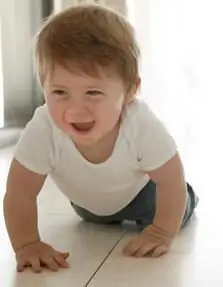2026 Author: Priscilla Miln | miln@babymagazinclub.com. Last modified: 2025-01-22 17:55:15
Every baby has an inborn sucking reflex, it helps to drink milk from mother's breast, that is, nature is responsible for survival. Some parents are worried that their child is putting his hands in his mouth and are trying to figure out if this is a bad habit or pampering? But in fact it is an instinctive impulse, and there is nothing dangerous in it.
Finger in mouth - stage of development
Each stage of development of the baby is characterized by new skills and behavior. He grows, learns to exist in this world and studies it. Thumb sucking is one of such important stages and periods of development. Getting a little older, the kids find their legs and can kiss them with gusto too.
Even during pregnancy, on an ultrasound examination, a mother and a doctor on the screen can see a baby with a finger in her mouth. And this is a signal that the baby is relaxed, calm, everything is fine with him. Bringing the fist to the mouth, taking it into the mouth and holding it there requires some coordination of movements. And the baby thus demonstrates his first skills.

Reasons
And yet, what are the reasonsencourage you to put your fingers in your mouth? As a rule, a child sucks his thumb at 3 months because:
- So he calms down better, for example, when he falls asleep. Sucking reminds him of pleasure when he eats milk from his mother's breast, it relaxes and allows him to fall asleep faster.
- The baby makes it clear that he is hungry or not satisfied until the end. If artificial feeding is practiced, then this may be due to an overly large hole in the silicone nipple - the baby ate too quickly, and the feeling of fullness has not yet come. If the baby is breastfeeding, the cause may be insufficient breastfeeding.
- Anxiety (mom doesn't pick up for a long time or has disappeared from view).
- Teething, although some may find it too early for a 3 month old baby. I want to suck my finger or fist because my gums itch.
- Sad mood. This happens with adults too, when you immerse yourself in yourself and start doing one simple action automatically.
The problem may be deeper, for example, the child sucks on his fist because of a strong fright, insecurity or lack of parental love. These situations are extremely rare and are accompanied by tearfulness and agitation.

Parents' fears
Attempts by older relatives to pull the baby's fist out of their mouths are due to various fears:
- The constant presence of a finger in the mouth prevents teeth from forming in the correct position.
- If a baby sucks his thumb, he will spoilbite yourself.
- The skin on the finger is deformed and will not recover.
- Sucking will become a bad habit and will be fixed in adulthood.
The first and second points are debunked by dentists, who argue that if there is a negative effect from sucking, it will only affect milk teeth. The molars are formed at the age of five or six years. By this age, the habit of thumb sucking has already disappeared by itself.
As for delicate skin, which can become rough from being constantly in the mouth, since the human body is prone to regeneration (recovery), with the cessation of sucking, the cover will be restored.
Pulling your hands into your mouth can really turn into a bad habit, but it's too early to worry about it if a child sucks his thumb at 3 months. If the baby is breastfeeding, breastfeed more often to satisfy the need to suckle. Then he won't feel like holding a pen in his mouth.
Negative Consequences
Real negative points that may arise:
- Maintaining that the baby's hands are always perfectly clean is difficult, so any contact with them in the mouth is a possibility of germs entering there. They can provoke the development of diseases of the oral cavity due to various infections, because the baby's immunity is not yet strong enough to resist.
- While the baby sucks his finger or procrastinates his fist, a lot of saliva is released. It can cause irritation around the lips. Bibs will help save the day.

How to stop a baby from thumb sucking?
Most often there is no need for weaning. It is worth remembering that this is the next stage of growing up and learning about the world, which will soon be replaced by another. And interference in the development and harmonious growing up of your baby is not always justified.
Sometimes it's enough just to be there, to make it clear to the baby that there is nothing to worry about, he is safe. Don't leave him alone if you notice that being alone makes him uneasy.
Another gentle option to prevent the urge to put your fingers in your mouth can be to use baby gloves. True, many active children wave their arms and legs so vigorously that this method only works for a few minutes.

If you are sure that the baby is full, happy, playful, all possible negative reasons have been eliminated, but he stubbornly pulls his fingers into his mouth, then try to offer him a replacement:
- pacifier with silicone pacifier;
- small teethers that fit in a small pen;
- rag, wooden or silicone safe toys.

More serious causes of fist sucking are corrected by the mother's gentle and caring attitude, full of unconditional attention, and body contact (carrying, cuddling, relaxing massage).
What not to do?
If a baby sucks his thumb at 3 months, thendo not sharply and categorically try to wean it by physical methods. Also, in no case should:
- shaming, scolding, yelling - this can provoke the opposite effect and stress;
- smear fingers with something bitter;
- to constrain the movements of the child's arms so that he does not have the opportunity to reach his face - this will only bring the baby suffering.

At what age should you start worrying
The active period of the sucking reflex lasts up to 4-5 months. The need to suck fingers, fists, mother's breasts gradually fades away, the child learns to express his mood differently and explore the outside world. Breast and bottle are already beginning to be perceived as an opportunity to satisfy hunger. But for this to happen, the baby needs to stay at the breast for as long as he needs until he releases himself or turns away, satiated.
Until the age of 10 months, the satisfaction of the sucking reflex by the baby by taking fingers into the mouth should not cause concern. But such a habit for a child over three years old can be one of the serious reasons and a reason to see a doctor. Possible factors:
- lack of care and love from parents, lack of attention;
- consequences of birth trauma, hypoxia;
- constant stress, nervous excitement;
- psychological trauma (children are very sensitive and experience problems in the family much brighter than adults).
For children over three years of age, thumb sucking can affectdevelopment of speech defects, malocclusion.
Opinion of Dr. Komarovsky
The famous pediatrician, like other modern doctors, is inclined to believe that sucking fingers in infants is a natural instinctive sucking reflex. Fighting him, in his opinion, is useless. If parents want to “take away” a finger from a child, then they certainly need to give something in return. You can switch your attention to a pacifier, experimenting with their various types, or to a toy. In other words, do not try to eradicate this fact, but offer an alternative to it.
Recommended:
Why does a child suck his thumb? Main reasons

Thumb sucking is one of the inborn reflexes of a newborn. Most children forget about this habit as they grow older, because now they have a pacifier or mother's breast to satisfy the instinct. Other babies continue to suck their thumbs at two or even three years old. What are the reasons that influence the formation of this habit and how to get rid of it once and for all, we will tell in our article
Baby at 8 months: daily routine. Baby food at 8 months

The baby is growing incredibly fast. In the first year of his life, this manifests itself especially quickly. In this article, we will talk about the menu of the child at 8 months, as well as what should be the approximate daily routine of the baby
How to develop a baby at 3 months? Child development at 3 months: skills and abilities. Physical development of a three-month-old baby

The question of how to develop a child at 3 months is asked by many parents. The increased interest in this topic at this time is especially relevant, because the baby is finally starting to show emotions and is aware of his physical strength
At 8 months, what should a baby be able to do? Baby development calendar at 8 months

Worry about your baby's development? In this article, you will learn all the basic skills that your child should have at eight months of age
Sleep of a baby by months. How much should a month old baby sleep? The daily routine of the baby by months

The development of the baby and all internal organs and systems depends on the quality and duration of the baby's sleep (there are changes by months). Wakefulness is very tiring for a small organism, which, in addition to studying the world around it, is almost constantly developing, so babies sleep a lot, and grown-up children literally fall off their feet in the evenings

